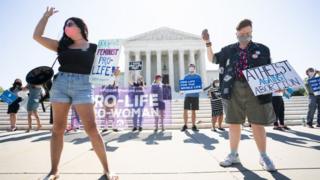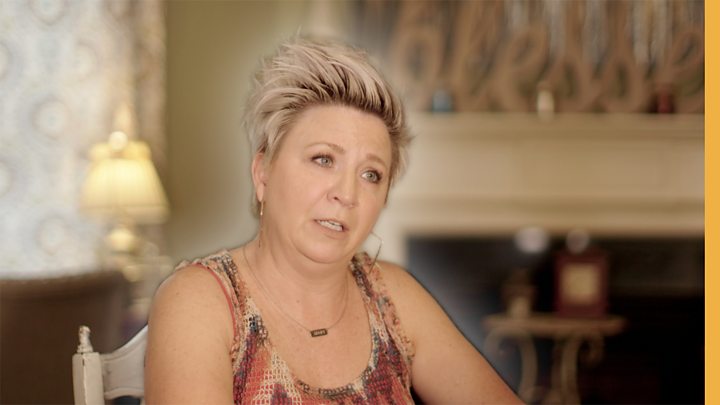This website uses cookies so that we can provide you with the best user experience possible. Cookie information is stored in your browser and performs functions such as recognising you when you return to our website and helping our team to understand which sections of the website you find most interesting and useful.
 Image copyright EPA
Image copyright EPAThe US Supreme Court has ruled that a law restricting abortions in Louisiana is unconstitutional.
In a landmark decision, the justices said a law requiring that doctors who provide abortions have the right to admit patients at a local hospital placed an undue burden on women.
Chief Justice John Roberts joined liberal justices in the 5-4 decision in a blow to anti-abortion groups.
The court struck down a similar policy in Texas in 2016, the opinion noted.
This was the first major abortion case ruling from the Supreme Court during the Trump presidency.
The 2014 Louisiana law said that doctors must hold so-called admitting privileges at hospitals within 30 miles (48km) of their practice.
But critics said the controversial law would limit the number of providers in the state, violating a woman's right to an abortion.
What was the case about?
June Medical Services v Russo asked the Supreme Court to rule on whether to uphold a lower court's opinion concerning the Louisiana law.
The law required doctors to have admitting privileges to a hospital "not further than 30 miles from the location at which the abortion is performed or induced" in order to perform abortions.
While the state said the requirement was to protect women's health, pro-choice advocates said that it's incredibly rare for women to face complications from an abortion. They also pointed out that many hospitals in the region are religiously-affiliated or conservative and don't allow abortions to take place in their facilities, which severely limits the number of doctors who can carry out the procedure.
This then, in turn, constitutes an undue burden on a woman's constitutional right to seek an abortion, they said.
A district court agreed that the law was unconstitutional, however, the 5th Circuit appeals court determined no clinics would "likely be forced to close" because of the law, and allowed it to stand.
The petitioners asked the Supreme Court to rule on whether that decision violated past precedents and should be struck down.
Adding to conservatives' anger
Conservatives have been given yet another reason to be infuriated by John Roberts.
The Supreme Court chief justice, appointed by Republican President George W Bush, provided the decisive vote striking down a Louisiana law regulating abortion providers.
Roberts' critics will find little consolation in his argument that while he disagreed with a five-year-old court precedent in a similar case, he was compelled to respect it. The other Republican-appointed justices, including the two nominated by President Donald Trump, all were willing to steer the court toward allowing greater abortion restrictions.
This decision, as well as recent holdings on gay rights and immigration, suggests the ideological disposition of the Supreme Court will again be at stake in November's upcoming presidential election.
Roberts' rulings were frequently narrow and technical in nature - reminding liberals of just how tenuous their victories have been and giving hope to Republicans that a real conservative majority is just one more appointment away.
Four years ago, an open Supreme Court seat helped Trump rally doubtful conservatives to his side, while Democrats seemed less concerned with the court's ideological future. That may have been enough to carry Trump to his razor-thin victory.
The president may hope history repeats itself.
What did the justices say?
Writing the majority opinion, Justice Stephen Breyer disagreed with the 5th Circuit court reasoning for upholding the Louisiana restrictions.
Justices Ruth Bader Ginsburg, Sonia Sotomayor, and Elena Kagan joined Justice Breyer's opinion. Justice Roberts concurred, but filed a separate opinion noting that the reason for the ruling was because of the court's decision "four years ago invalidating a nearly identical Texas law".
Justice Roberts, a conservative, noted that he dissented in the Texas case, but the question in today's case was not whether that precedent was right or wrong, "but whether to adhere to it".
The court's other conservatives, Clarence Thomas, Samuel Alito, Neil Gorsuch, and Brett Kavanaugh dissented.
Justice Thomas wrote: "Today a majority of the Court perpetuates its ill-founded abortion jurisprudence by enjoining a perfectly legitimate state law and doing so without jurisdiction."
Justice Thomas also took issue with the fact that the lawsuit was brought by abortion providers, not women themselves, saying for most of the Court's history, it "maintained that private parties could not bring suit to vindicate the constitutional rights of individuals who are not before the Court".
"Our abortion precedents are grievously wrong and should be overruled," he wrote.
Abortion rights advocates have said, however, that mandating women come forward to challenge abortion laws themselves will limit the number of challenges, as many patients do not have access to the financial and legal resources.
What's the reaction?
Nancy Northup, president of the Center for Reproductive Rights - the group that challenged the Louisiana law - said the ruling was a relief, "but we're concerned about tomorrow".
"As a result of this decision, the clinics in Louisiana can stay open to serve the one million women of reproductive age in the state," she said.
"Unfortunately, the Court's ruling today will not stop those hell-bent on banning abortion. We will be back in court tomorrow and will continue to fight state by state, law by law to protect our constitutional right to abortion."
The White House denounced the ruling, and said it "devalued both the health of mothers and the lives of unborn children".
Southeastern Baptist Theological Seminary Professor Karen Swallow Prior, who is against abortion, told the BBC today's ruling was unsurprising.
"Admitting privileges are a relic from a bygone era of healthcare. The real issue - the same issue at the centre of the Roe v Wade ruling - is the status of the unborn child."
She said rather than the Supreme Court, the anti-abortion movement should focus on changing people's minds.
What's the situation with US abortion laws?
Last year saw a rise in the number of Republican states enacting abortion restrictions or passing laws that ban abortion even before many women know they're pregnant.
According to the American Civil Liberties Union, 59 restrictions were passed in 2019 along with bans in several states, including Alabama, Georgia, Kentucky, Missouri and Ohio.

Media playback is unsupported on your device
Anti-abortion groups hope the contested laws will make their way to the Supreme Court and allow for Roe v Wade to be overturned.
If that happens, abortion will not become illegal across the country - rather, the decision will return to the individual states.
And some states have acted to safeguard abortion rights. New York and Illinois last year recognised the right to end, continue or prevent a pregnancy as a fundamental right. They also allow some qualified nurses to provide abortion care.
The bans and many of the restrictive policies have been blocked in courts. Louisiana's case, had it not been struck down, could have set a precedent for similar laws restricting abortions without criminalising them.



 Africana55 Radio
Africana55 Radio 
